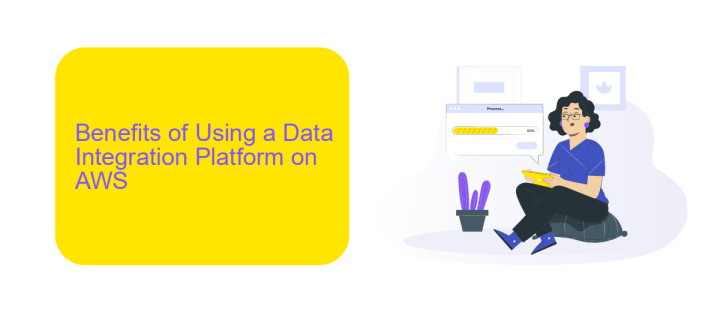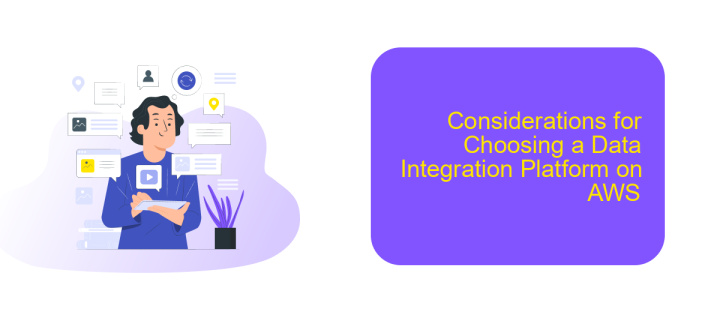Data Integration Platform for AWS
In today's data-driven world, seamless integration of diverse data sources is crucial for informed decision-making. AWS offers a robust Data Integration Platform designed to streamline data workflows, enhance data accessibility, and ensure real-time analytics. This article explores the key features, benefits, and implementation strategies of leveraging AWS's powerful tools to unify and harness your data landscape efficiently.
Introduction
Data integration is a critical component for businesses leveraging AWS to manage and analyze their data. A robust Data Integration Platform ensures seamless connectivity between various data sources, enabling efficient data flow and real-time analytics. This not only enhances decision-making but also optimizes operational efficiency.
- Real-time data synchronization across multiple platforms
- Automated data transformation and enrichment
- Scalable architecture to handle growing data volumes
- Comprehensive monitoring and error handling
One of the essential tools for setting up seamless integrations is ApiX-Drive. This service allows businesses to automate data workflows without extensive coding, facilitating quick and reliable connections between disparate systems. By leveraging ApiX-Drive, companies can focus on deriving insights from their data rather than getting bogged down by integration complexities.
Benefits of Using a Data Integration Platform on AWS

Leveraging a Data Integration Platform on AWS offers numerous benefits, including scalability and flexibility. AWS provides a robust infrastructure that can handle vast amounts of data, ensuring seamless data flow and integration even as your business grows. This allows organizations to scale their operations without worrying about data bottlenecks or performance issues. Additionally, AWS's pay-as-you-go pricing model ensures cost efficiency, allowing businesses to only pay for the resources they use, which can lead to significant cost savings.
Another key advantage is the ease of integration with various data sources and third-party services. Platforms like ApiX-Drive facilitate the connection between different applications and services, automating data workflows and reducing manual intervention. This not only enhances operational efficiency but also ensures data accuracy and consistency across different systems. Furthermore, AWS's extensive suite of tools and services, such as AWS Glue and Amazon Redshift, further streamline data integration processes, enabling businesses to derive actionable insights quickly and effectively.
Features of a Data Integration Platform on AWS

A Data Integration Platform on AWS provides a robust and scalable solution for managing and integrating diverse data sources. It leverages AWS's vast ecosystem to ensure seamless data flow and transformation.
- Scalability: AWS's elastic infrastructure allows the platform to scale according to the data volume and processing needs.
- Security: Advanced security features, including encryption and IAM, ensure data integrity and compliance.
- Real-time Data Processing: Services like AWS Kinesis enable real-time data ingestion and analysis.
- Automation: Tools such as AWS Glue automate the ETL (Extract, Transform, Load) processes, reducing manual intervention.
- Integration with Third-Party Services: Platforms like ApiX-Drive facilitate seamless integration with various third-party applications, enhancing data connectivity.
By leveraging these features, businesses can ensure efficient data management and integration, leading to more informed decision-making. AWS's comprehensive suite of tools and services makes it an ideal choice for building a robust Data Integration Platform.
Considerations for Choosing a Data Integration Platform on AWS

Choosing the right data integration platform for AWS is crucial to ensure seamless data flow and efficient operations. Several factors must be considered to make an informed decision that aligns with your business needs and technical requirements.
First, evaluate the platform's compatibility with AWS services. Ensure it supports the AWS ecosystem, including S3, Redshift, and RDS. Additionally, consider the platform's ability to handle various data formats and sources, such as structured, semi-structured, and unstructured data.
- Scalability: Can the platform scale with your data volume and business growth?
- Security: Does it offer robust security features, including encryption and compliance with regulatory standards?
- User-Friendliness: Is the platform easy to use, with a user-friendly interface and comprehensive documentation?
- Integration Capabilities: Can it seamlessly integrate with other tools and services, such as ApiX-Drive, to automate workflows?
- Cost: Is the pricing model transparent and does it fit within your budget?
Finally, consider the support and community around the platform. A strong support system and active community can be invaluable for troubleshooting issues and optimizing your integration processes. Taking these factors into account will help you choose a data integration platform that meets your AWS needs effectively.
Conclusion
In conclusion, a robust Data Integration Platform for AWS can significantly streamline data management and enhance operational efficiency. By leveraging AWS's extensive suite of tools and services, businesses can seamlessly integrate disparate data sources, ensuring real-time data availability and accuracy. This integration not only supports better decision-making but also drives innovation by enabling advanced analytics and machine learning capabilities.
Moreover, utilizing services like ApiX-Drive can further simplify the integration process. ApiX-Drive offers a user-friendly interface and powerful automation features, making it easier to connect various applications and data sources without extensive coding. This enhances the scalability and flexibility of your data integration strategy, allowing you to adapt quickly to changing business needs. Ultimately, a well-implemented Data Integration Platform on AWS, complemented by tools like ApiX-Drive, can provide a competitive edge by optimizing data workflows and unlocking valuable insights.
FAQ
What is a Data Integration Platform for AWS?
How does a Data Integration Platform benefit my AWS environment?
What types of data sources can be integrated with AWS using a Data Integration Platform?
Is it possible to automate data integration tasks on AWS?
How do I ensure data security and compliance when using a Data Integration Platform on AWS?
Apix-Drive is a universal tool that will quickly streamline any workflow, freeing you from routine and possible financial losses. Try ApiX-Drive in action and see how useful it is for you personally. In the meantime, when you are setting up connections between systems, think about where you are investing your free time, because now you will have much more of it.

